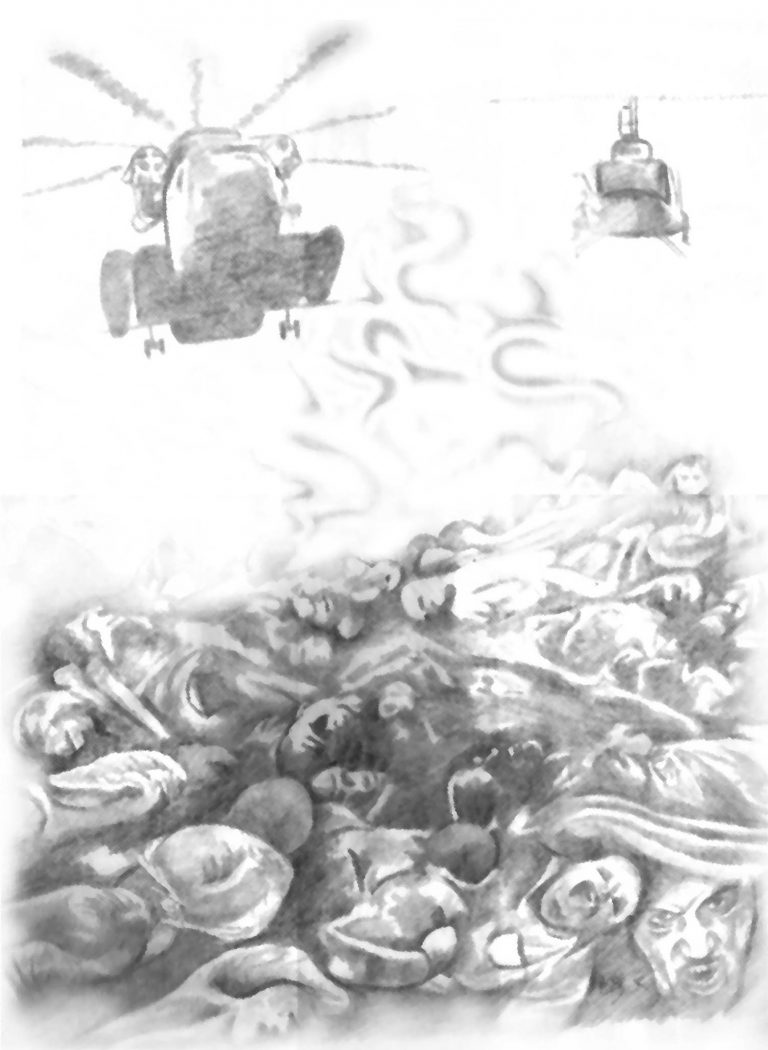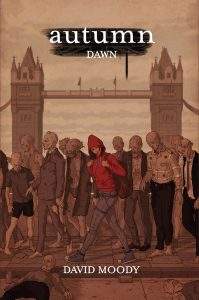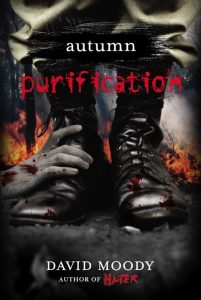Above and Below (the prologue to Autumn: Purification)
Forty-seven days ago, more than ninety-nine per cent of the population had died within an impossibly short period of time. Right across the world, without any warning or explanation, the pattern was repeated as billions of lives were inexplicably ended: snuffed out and switched off with neither dignity nor malice, unimaginable numbers of innocent people discarded and abandoned and left to rot where they’d fallen. Just a handful of terrified survivors remained, none of them able to understand or even to begin to come to terms with what had happened to their friends, family, lovers, children…

Within forty-eight hours, almost a third of the dead rose again. The germ (or disease, or whatever it was that was responsible) had spared a key area of these creatures’ brains. Somehow unaffected, a spark of primordial instinct had survived the infection, leaving the bodies physically dead, but still compelled to move; lifeless, but incessantly animated. And as the flesh which covered these stumbling aberrations had rotted and decayed, so the unaffected region of the brain had grown in strength, and had continued to drive them forward. First their most basic senses had slowly returned, then a degree of control. The corpses didn’t know what, who, or where they were. They didn’t know why they existed, nor what they wanted. They had no need to eat or drink, to rest or sleep, or even to blink or breathe… they just were. This combination of increasing self-awareness and decreasing self-control gradually manifested itself as anger and hostility. Sentenced to spend every minute of every day shuffling pointlessly through the empty world, even the slightest unexpected sound or movement was enough to attract their limited but deadly attention.
With the country (and the rest of the world) now otherwise almost completely silent, the mobile dead moved randomly from their supposedly final resting places, staggering in all directions on rotting, unsteady feet, away from the towns, cities and other centres of population where they’d died, spreading aimlessly across the land like a drop of ink slowly flowing outwards over blotting paper.
Except here.
Here, in apparently nondescript fields miles from anywhere of any perceived importance, for no immediately visible reason, thousands upon thousands of inquisitive, rancid bodies had arrived, cramming themselves into the space of just a few square miles: an endless mass of empty, skeletal husks which had once had individual identities and lives and reasons to exist, but were now nothing more than emotionless collections of tattered rags, grey-green greasy flesh, withered muscle and brittle bone.
At the outermost edge of one of the vast fields, the dishevelled carcase of what had once been an affluent investment banker lifted its head and looked up, barely able to focus its clouded eyes. Surrounded on all sides by scores of similarly bedraggled cadavers, the remains of the once-powerful, dignified and well-respected man shuffled awkwardly forward, slipping and sliding through churned mud, and clawed clumsily at those bodies which stood in its way.
Survivors.
This place was different to everywhere else. It didn’t know what, but it knew there was something near here, and it had an instinctive, insatiable desire to get even closer to whatever it was. It didn’t know why – it barely even knew what it was doing – but it couldn’t stop.
Buried deep underground, far below the rotting crowds, almost three hundred survivors existed in the unnatural semi-darkness of a subterranean military base. It was impossible for them to exist there without revealing their location: The world was a silent, lifeless, empty place now, and the sounds made by the people underground, no matter how slight, echoed relentlessly. The heat they produced burned like a fire, and in the otherwise cold and vacant land, the corpses were attracted to them like moths towards the last light on Earth. What had begun as a few random corpses stumbling upon the underground military base by chance had now grown into a crowd of vast, almost incalculable proportions. The movement of the loathsome creatures inevitably attracted more and more of them from the surrounding area: a slow-motion chain reaction. Now, several days since any of the soldiers had been above ground, almost one hundred thousand bodies had gathered around the bunker, every last one of them fighting to get nearer to its impassable entrance.
The dead investment banker’s way forward was blocked by more bodies. It lifted its emaciated arms again and then, with unexpected force, lashed out at the figure immediately in front. Soft, putrefying flesh was ripped from bone as the decaying banker tore the unsuspecting creature ahead of it apart. The sudden outburst of violence spread rapidly through the nearest cadavers on all sides, rippling out further into the enormous crowd in every direction before petering out again as quickly as it had begun. All across this massive, decomposing gathering the same thing was happening, time and again, each of the bodies interested only in getting closer to whatever it was that was different about this godforsaken place.
Apart from the wind blowing through the swaying branches of trees and the fighting and continual shuffling movement of the dead, the world around the buried base appeared frozen. Even birds had learnt not to fly too close, because of the reaction their fleeting appearances invariably caused. In spite of the fact that the corpses were individually weak and clumsy, what remained of the rest of the world instinctively feared them, and did all they could to keep their distance. And however individually weak, in such huge numbers as this the dead were unstoppable.
Deep underground in the military base, the living fared little better. Despite being relatively strong and still able to act rationally, they were afraid to move. It was obvious to all the lost and terrified souls buried in the concrete maze below the fields and hills that the sheer number of bodies on the surface would eventually be too much for them. Their options were desperately limited, and frighteningly bleak. They could either sit and wait (although no one knew what they were waiting for, or how long it would take) or they could go above ground and fight. But what would that achieve? What use was open space and fresh air to the military? The disease still hung heavy in the contaminated air, and every one of the soldiers, NCOs and their officers alike, knew that a single breath would, in all probability, be enough to kill them. Those survivors immune to the disease who also sheltered underground knew that they would fare no better from such a confrontation. Any attempt to clear the bodies from above the base might help in the short term, but the noise and movement such an act would inevitably cause would doubtless result in countless thousands more cadavers being drawn nearer to the shelter – and there were potentially millions more out there.
Below the surface, the survivors and the military were forced to remain apart. Designed to cope with the after-effects of chemical, nuclear or biological attack, the base was remarkably well-equipped and technologically advanced. The air being pumped through the complex was pure, and free from infection. The survivors who had taken shelter there, however, were not. Decontamination had been half-heartedly attempted at first, but the woefully under-prepared military scientists had known from the start that it would be a futile exercise. The germ could be washed away from equipment and from the soldiers’ protective suits, but the survivors had been breathing contaminated air for more than a month, and they were riddled with the infection. Whilst the deadly contagion had no obvious effect on them, even the slightest exposure might be sufficient to contaminate the base and kill everyone in it.
The military occupied almost all of the complex (everything beyond the entrance to the decontamination chambers), leaving the thirty-seven survivors with the main hangar and a few adjacent storage, utility and maintenance rooms. Space, heat and light were severely limited. After fighting through the hell above ground to get here, however, the limitations of the military facility were readily accepted and hugely appreciated. The alternatives which awaited them back out on the surface were unthinkable.










